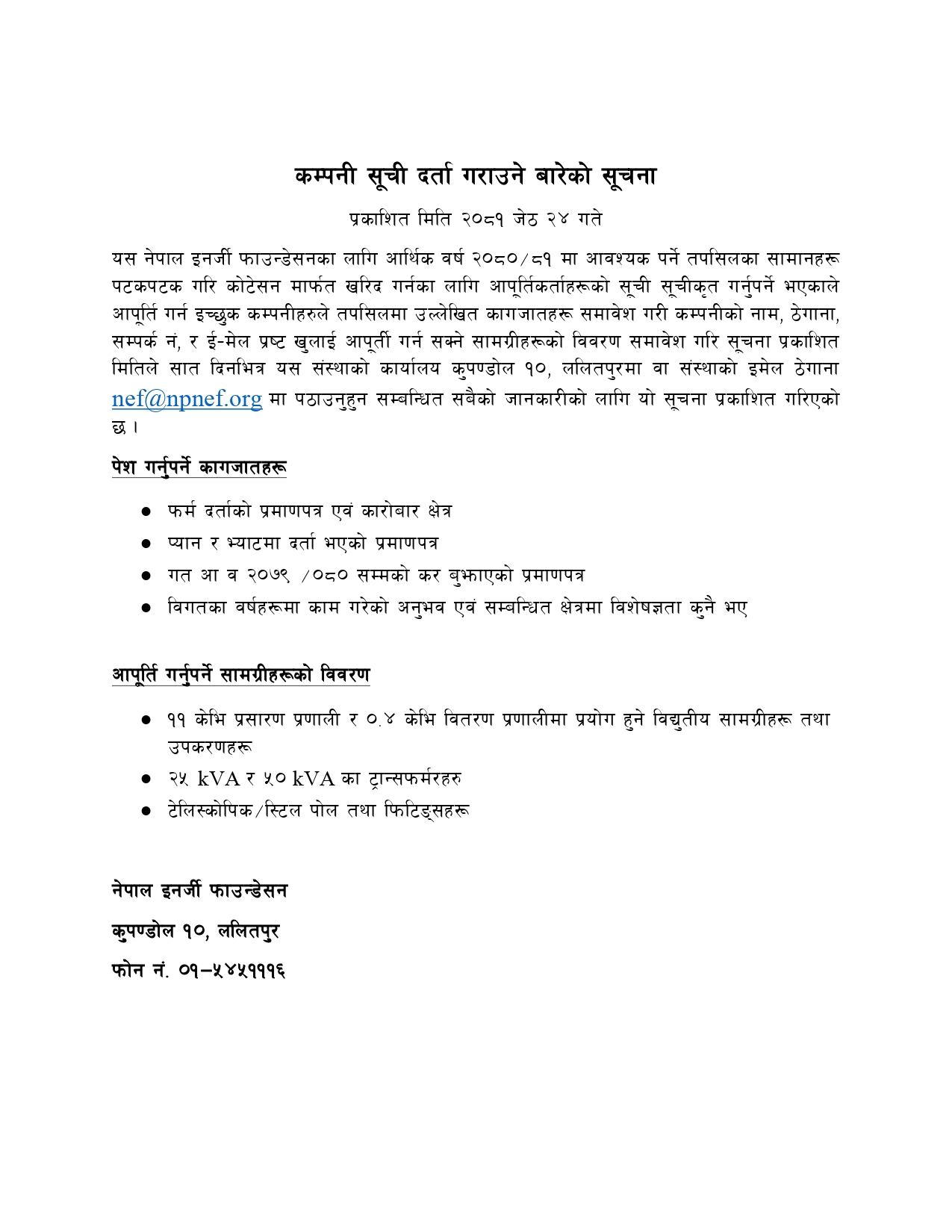Nepal Energy Foundation (NEF) is a non-profit professional organization that works in energy sector of Nepal. It was established in 2015 and is legally registered under Company Act 2006. NEF is managed by highly motivated and experienced board of directors and overseen by Managing Director in accordance with the Company’s Memorandum and Articles of Association.
Nepal Energy Foundation is dedicated to promote sustainable energy in Nepal since its establishment. Aim of NEF is to contribute for ensuring sustainable, reliable and affordable energy solutions in Nepal through capacity building, research, policy innovation, community mobilization and awareness creation. For ensuring the sustainability of distributed renewable energy generation projects (e.g. Micro Hydro and Solar), NEF provides its continuous efforts through innovative approaches. Partnership with, supporting, and advising local government to opt in climate friendly energy solutions, and preparation of policy in various aspects of energy sector is a major focus of NEF. NEF is committed and continually contributing to achieve SEforALL goals and SDGs.
NEF was established with the aim of providing efforts for making the energy sector of Nepal sustainable and has been successful in starting some initiatives as envisioned. NEF have been able to start few major initiatives that are of great importance to entire energy sector, to the society, and the nation.
With the view that energy projects bring knowledge and opt for one-time implementation or implementation during the project period which would make sustainability uncertain, NEF has been advocating that sustainability can only be assured when issue holder work for themselves by themselves. With this vision, NEF has supported for formation for two networks: National Mini/Micro Hydro Power Users Society Nepal (NAMHUS), and Women Network for Energy and Environment (WoNEE). As a result of NEF’s continuous support and effort in capacity development, both of the networks have been able to be established as one of the influencing institutions in the renewable energy sector of Nepal who speak the voices of grassroot people in energy. And, NEF considers that a lot is yet to be done to make both of the networks to become influential in policy level.
NAMHUS has 125 Micro Hydro Projects (MHPs) as its members all over the country. The network is working as an association to address common issues, challenges, and a forum to raise collective voice of MHP users. NAMHUS represents micro hydro users of all over the country, and will work for energy security, and economic benefit for far end rural communities adopting evidence-based advocacy and lobbying. In one hand, the network will work for technical and managerial capacity enhancement of the MHP users (e.g, grid synchronization technology, synchronization policy, tariff), and on the other hand, the network will support for promoting productive use of electricity and create more economic opportunities within their locality by the use of locally generated electricity, and thus will support in sustainability of micro hydro plants.
With the aspiration of NEF in institutionalizing women’s efforts in energy and environment, WoNEE was formed on 3rd September 2017 for promoting women’s access in policy process and decision making. WoNEE is present in all provinces and has more than 100 local networks. Thus, through the use of its social mobilization capability, WoNEE is expected to improve the economic status of women and establish an effective advocacy mechanism to make women friendly energy policy, and create a continuous mechanism to mainstream gender issues in energy sector of Nepal.
With the vision that Green Hydrogen is the best option for future energy security for Nepal, NEF has been working with its international partners in piloting green hydrogen production and its utilization as cooking fuel.
Besides its activities in research, innovation, capacity building, advocacy, NEF has also worked as a Nepal Think for Cross Border Energy Trade and has developed a robust model of cross border electricity trade for Nepal which has been adopted in the recent power trade agreement between Nepal and India.
Since its establishment, NEF has tried its best to support the energy sector of Nepal as per its capacity. Working with a range of people from grassroot level women, marginalized people, communities, academicians, experts, and policy makers, NEF has tried to work as per the vision and mission of organization and finds itself on the way towards meeting its mission.


